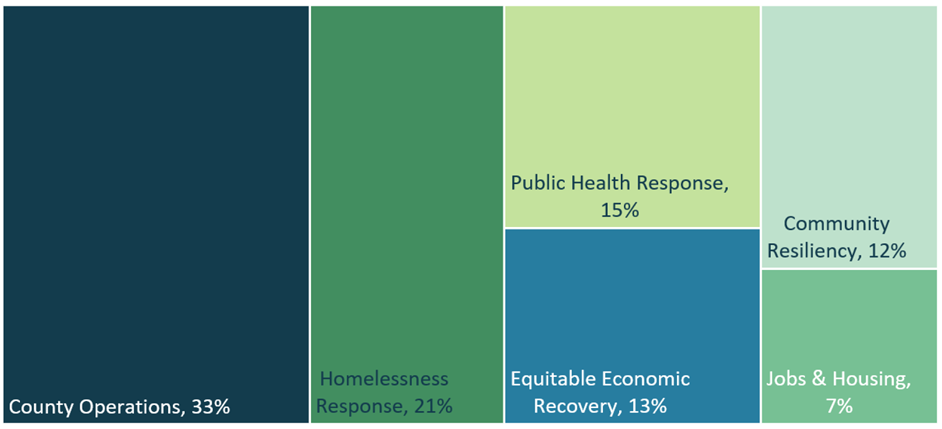COVID-19 response and recovery funding
About the funding
King County received more than $2 billion in federal funding in response to the COVID-19 pandemic, including $437 million in Coronavirus Local Fiscal Recovery (CLFR) funds through the American Rescue Plan.
CLFR funds in action
These videos give you an inside look at some of the important programs funded by King County’s COVID-19 response and recovery funding.
Behavioral health apprenticeship program
Supporting seniors, building community
Remote jury selection
From farm to foodbank
King County Recovery Plan
Check out the latest King County Recovery Plan Annual Report to learn more about how King County is investing its CLFR funds to ensure an equitable recovery for everyone in our community.
2025 Recovery Plan Report
2024 Recovery Plan Report
2023 Recovery Plan Report
2022 Recovery Plan Report
2021 Recovery Plan Report
CLFR investment highlights
Homelessness response - $97 million
King County designated more than $97 million for its homelessness response. CLFR-funded homelessness interventions included hotel/motel leases, COVID-19 shelter de-intensification, permanent supportive housing, behavioral health services, homeless outreach and shelter procurement, enhanced shelter, and sanitation.
Public health response - $68 million
King County’s robust and equitable public health response to COVID-19 resulted in the County having among the lowest rates of any county for case counts and deaths from COVID-19, as well as the local distinction as the “most vaccinated county” in Washington.
Equitable economic recovery - $60 million
King County's CLFR-funded economic recovery programs supported businesses, the creative economy, and the tourism sector, as well as workforce development programs.
Community resiliency - $56 million
King County allocated $56 million to address the pandemic impacts in the community. Investments included a variety of behavioral health supports, youth and family programs, food security programs, and substance use prevention programs. These community programs dovetailed with other King County initiatives, including Health Through Housing (HTH) and Best Starts for Kids, and are meant to complement and enhance other resources at the local level.
Jobs and Housing - $27 million
The Jobs and Housing Program connected individuals experiencing homelessness with jobs and permanent housing, along with career development and other services. The program was designed to serve over 400 individuals, with the goal of supporting their transition out of homelessness.
County operations - $154 million
King County allocated more than $154 million in funding for County operations. This included CLFR-funded operational/administrative programs as well as funding for general government services meant to replace lost revenue. Support of government services included public health and safety employees who provide the vital service of managing safe, secure, and humane detention facilities and community corrections programs.
CLFR investments

Notable projects
King County's Safestart Program was featured in Results for America's American Rescue Plan (ARP) Data and Evidence Dashboard, which identified 110 notable projects that demonstrate how state and local leaders used federal funds to deliver better results for residents.
Take a look at all of the model ARP projects included in the dashboard:
- 44 examples of state and local governments using ARP funds to develop their in-house data and evidence capacity
- 24 investments in evidence-based solutions that can serve as models for scaling what works
- 44 projects that will be evaluated by state and local governments to better understand their impact
 Translate
Translate